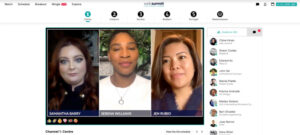Job hunting? We wouldn’t be surprised if you – and a lot of people you know – are looking: Microsoft’s recent Work Trend Index survey of more than 30,000 global workers discovered that 41% of employees were considering leaving their roles or changing professions this year. And a study from Personio of workers in the UK and Ireland uncovered that 38% of those surveyed planned to move on in the next six months to a year.
For those in Europe and the EU, the outlook appears to be good. The IMF reported a record low unemployment rate in the EU of 6.2% in January 2022, with labour force participation reaching an all-time high.
Has the Dutch workforce mastered all digital skills? Find out
If you’re looking for a new role now, it’s a smart idea to spread your bets. However, options are only a part of the job hunting picture, and once you’ve gotten through the recruiter screening and interview process, and have a couple of offers on the table, what should you do?
Grant Thornton’s recent State of Work survey uncovered the fact that of the survey respondents who took a new job in the past year, 31% of them had had two offers. 16% of them had three offers – and a further 6% had five or more job offers.
So, here’s how to handle the process with finesse, so that you get the very best offer you can.
Should I Say I Have Another Offer?
Sure – and in fact, you may be asked if you are interviewing elsewhere or have any other offers. You can tell them if you have another job offer, and ask for their best offer in writing. You can also ask them for a timeframe by which they’d like your final answer – a good idea as it will promote the idea that you are organised, process-oriented and will deliver on schedule.
Consider Each Offer Carefully
From salary and other financial benefits, such as share schemes, bonuses and pension contributions, weigh up the options for each role. Some jobs offer less in the way of base salary but better pension contributions and bonuses can add up to a larger overall package, so careful consideration is required.
It’s Not All About Salary
Of course, money is important, but there are other factors to consider. Assess the overall benefits package on offer and be sure to separate the perks (team building days) from the actual benefits (paid healthcare). How good is each company about professional development and training, and are there budgets and mentoring opportunities in place for both? Can your career advance – or will you be looking for another role within a short period of time?
Does The Culture Fit You?
We hear a lot about culture fit these days. In a nutshell, it is designed to assess whether your working preferences and values match the company you’re applying to join, and often candidates fall out of a previously smooth hiring process at a culture fit interview stage. They just weren’t “the right fit”. But you can use this in your favour too. Do the companies you’ve received offers from match up to the sort of company culture that’s right for you? Look at things like their hybrid or work-from-home policies, and assess how they handle parental leave if this is a consideration for you. Be aware that a fast paced, rapidly scaling start-up is unlikely to provide you with a relaxed day-to-day.
Positive Vibes
Not to be too woo-woo about it, but did you get a good vibe from the people and teams you met throughout the hiring process? It’s not uncommon nowadays to do multiple interview rounds, especially for tech toles. It’s likely you’ll have met with either people you’ll work directly with or report to during the interview process. How did you find them – did you get a good impression of the team and business you’re hoping to join? The people we work with can make or break our 9-5, so it’s important to get this one right.
Can I Renegotiate?
Yes, in a word. What you’re aiming to do here is to get a great job you really want to do, with a good package that reflects your worth. So if one job you’ve been offered is stronger on elements such as culture fit and you really liked the teams you met in the interview process, but the money and benefits are less, then you can be honest about it. Go back to the hiring manager and explain this role is your preference, but you’d be looking for a little more in the way of salary or benefits, and ask if they can match your other offer.
Catch our interview with Paul Down, Head of Sales at Intigriti.









